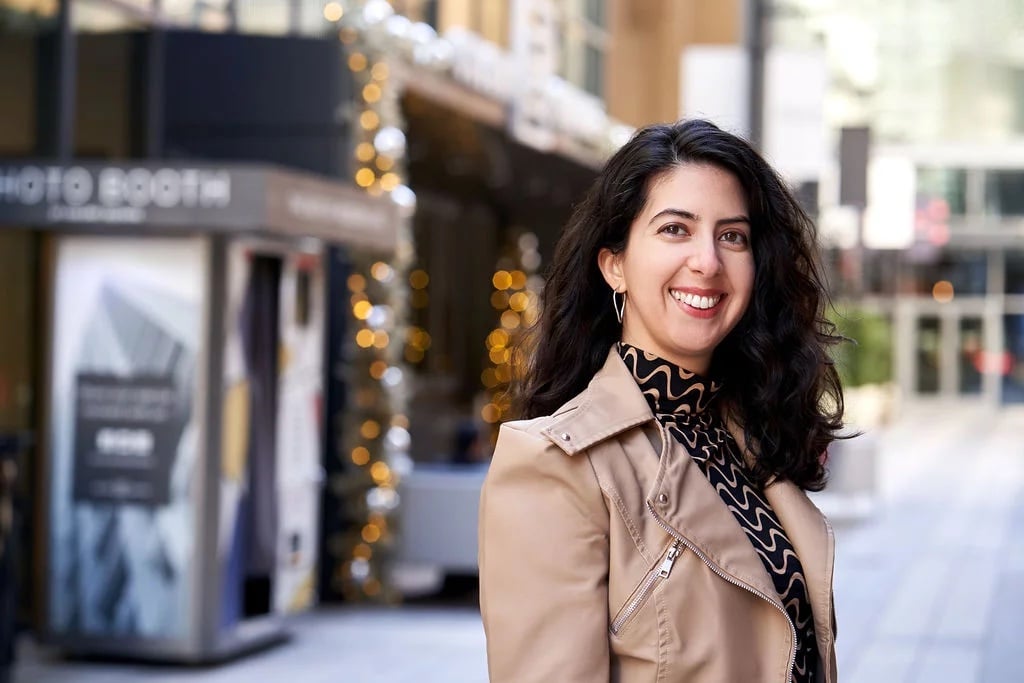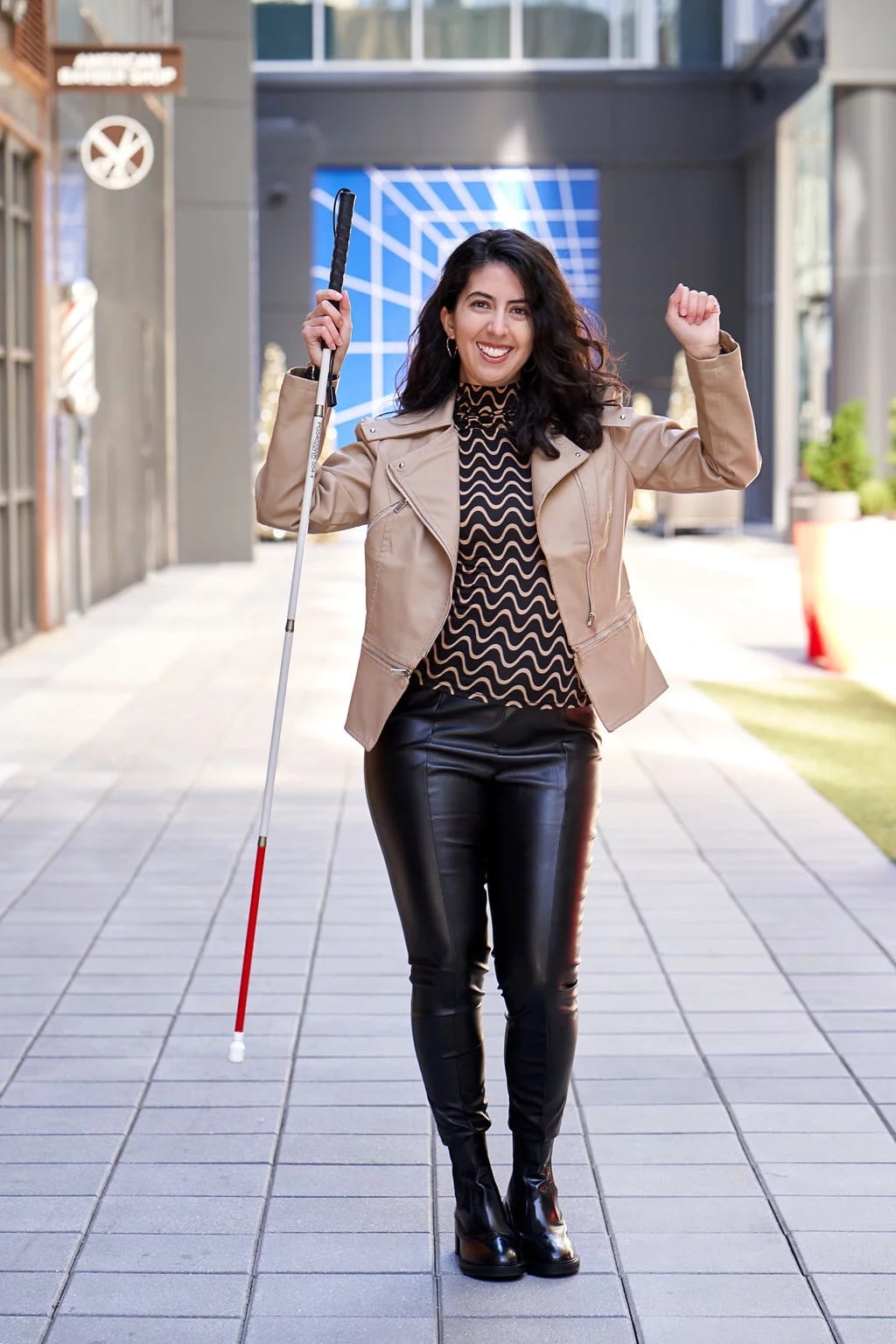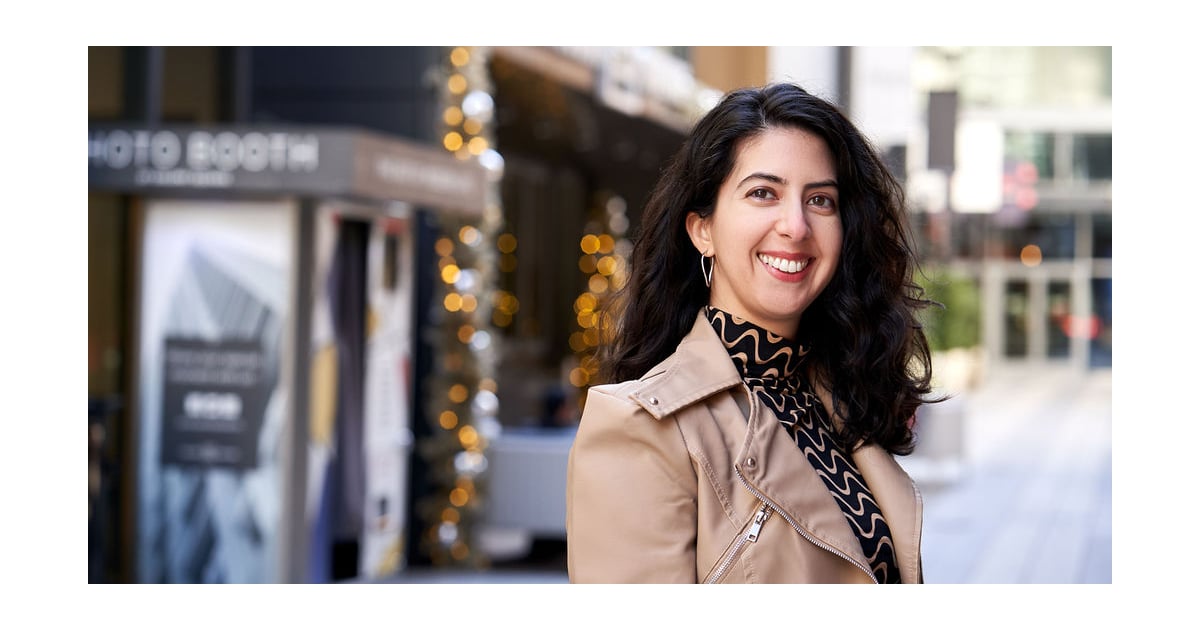
“Disability pride is an important concept for me. I’m proud of who I am, and that includes everything about me — including my disability,” says Catarina Rivera, a public speaker, DEI (diversity, equity, and inclusion) consultant, and content creator. Rivera, who was born and raised in Maryland, has been disabled her entire life. But that’s not stopping her from living a purposeful life filled with excitement and adventure. She was diagnosed as hard of hearing at a young age and has been wearing hearing aids since she was a toddler. Then at 17, Rivera was diagnosed with a progressive vision disability called Usher syndrome. “Today, I have a very small window of central vision, and I use a white cane to help me navigate the world,” she says.
Rivera’s condition creates progressive vision loss, which gives her tunnel vision, and despite having a tiny window of visibility, she’s considered to be legally blind. “So many people misunderstand blindness and think that all blind people see a pitch-black world, but in fact, only about 15 percent of us experience total blindness,” she explains. As a means to create positive change within her community, Rivera has been spreading positive knowledge about what it means to live having tunnel vision and having to use a cane.
“I wanted to represent my story and help create awareness among nondisabled people,” she says. “It’s said that knowing just one person of an identity group reduces prejudice and bias. I wanted to be that ‘disabled friend’ online for people that don’t have anyone in their life that’s disabled.”
To better demonstrate, Rivera has taken to her online platform, Blindish Latina, to explain and demystify some common beliefs about blindness, such as not being able to have an education or a career. Rivera herself debunks these myths, as she earned Master of Science in Education and Master of Public Health degrees and is a Certified Professional in Accessibility Core Competencies. “My ‘Blindness is a spectrum’ Reel has over five million views, and my ‘Let me tell you why I use a white cane even though I can still see’ Reel has over two million views!” she exclaims. “I want every blind person to feel comfortable using a white cane if it helps them. But many blind people are afraid of using a white cane and then being accused of faking their blindness or being harassed if they do have some remaining vision.”

Rivera herself has been harassed and questioned with comments like, “Why does she use a cane though?” or “Blind people can’t see — this is stupid.” Someone once even commented, “If you can see me, you’re not blind,” with a laugh emoji. But the Latina advocate takes those comments as an opportunity to continue educating the masses.
“To respond to online haters or negative comments, I will share an educational response or let them know where they can obtain resources. If the comment is wholly negative or unpleasant, I will either ignore it or respond with a firm message that asserts my boundaries,” she says. However, Rivera has learned to recognize when it’s nonessential for her to personally educate each commenter. “When necessary, I let go and trust that the resources I’ve already created are enough. Ultimately, I have to protect my energy.”
Rivera’s will and determination to enjoy life and opt for a glass-half-full mentality prove that taking that route leads to a life worth living. “Besides blindness and deafness both being spectrums, I think the largest myth I’ve debunked is that living a disabled life is a terrible life,” she says. “In response to disability, we often hear nondisabled people say things like ‘Oh, I could never live like that’ or ‘I could never deal with being blind. That would be the worst thing.’ These types of comments are rooted in ableism.” Rivera goes on to explain, “Ableism is the idea that nondisabled people are more worthy or valuable than disabled people.” She’s observed that there are a lot of nondisabled individuals who don’t believe that disabled people can have lives worth living.
“I’m living a beautiful life, and I share my disability joy often so that others can see my disability story and start changing their mindset about disability.”
“My story with deafblindness is that my life is exciting, full, and valuable,” Rivera says. “I went indoor skydiving, and I shared a post about that. I went to a salsa brunch in Brooklyn earlier this year, and I showed myself dancing — I’ve been dancing salsa for 19 years. I own a successful business. I took the month of August off and traveled around Greece. I’ve been studying Italian for two years. I’m living a beautiful life, and I share my disability joy often so that others can see my disability story and start changing their mindset about disability.”
Rivera, whose family is Puerto Rican and Cuban, shares she “didn’t encounter a lot of bullying growing up,” in regard to her disabilities. Instead, she was teased about something many Latina women might relate to. “I remember being teased for having hairy arms. I will never forget that,” she says. Moreover, Rivera is totally relatable to the schemes of growing up Latinx. “I love my culture. I love the food, the dancing, the dominoes, the way we can all connect even though we were from different places . . . I felt challenged by my privilege, especially when visiting Cuba. I also felt challenged by feeling in-between, which a lot of Latine people speak about. You don’t belong to your home country anymore but you also don’t quite belong in America.”
Like with many first or second-generation Latinx families, Rivera’s first language was Spanish, even though her parents are both English-dominant. She was in high school when she realized the privilege she held within her community with having a mom and dad who held higher education degrees and were avid English speakers.
“My parents both have master’s degrees and are English-dominant. I grew up in the suburbs and had a fairly sheltered life,” she recalls. “In high school, through a nonprofit organization, I met other Latine teenagers with very different lives. They had stories of challenges in school, discrimination, violence, etc.”
But recognizing that privilege is what moved the Latina activist to do something worthy within her community. Her desire to do impactful work has been a guiding star throughout her entire career path. Rivera began her career in education before continuing in public health and food justice work. Today, she focuses on disability inclusion and creating “a better world for all of us,” she says, adding her ultimate goal is to create a world that’s inclusive for everyone and where disabled people can thrive.
In addition to her work as a content creator, Rivera is spreading the word on disability through public speaking. In 2022 she delivered four keynote addresses while also being named a LinkedIn Top Voice in Disability Advocacy. Furthermore, she became a TEDx speaker, was featured in Forbes, was on live TV for the first time on ABC News Live, and hired a team of three.
“While many companies and organizations have DEI plans, many of them don’t include disability,” she says. “Oftentimes, companies and organizations haven’t understood that disabled people represent a large group of people.”
According to 2018 data from the CDC, one in four adults in the United States reports being disabled. Rivera makes the valid point that disabled people are in the workforce, customers, and also clients. To rectify the current workplace, her public speaking and consulting business helps companies begin or continue their disability-inclusion journeys to create better workplaces for everyone. The entrepreneur asserts her ultimate goal is to help create a world that’s inclusive for everyone “and where disabled people can thrive.”
And while sometimes people may think they’re being helpful, the advocate mentions it’s not always that way. “Don’t touch white canes or any other mobility aid. It’s an extension of a disabled person’s body,” Rivera says. “If you want to offer assistance to a blind person, ask them if they need help, and do not touch them or violate their personal space. If they say no, respect their response. They know what’s best for them.” Rivera notes this goes for all disabled people and indicates it’s only ethical to ask someone if they require help before automatically making the assumption they do.
Image Source: Nikki Rumph of Shots by Nik
